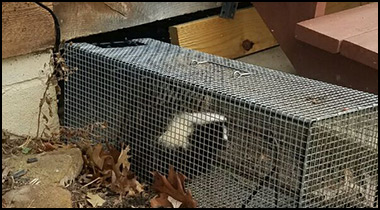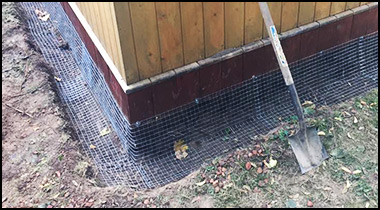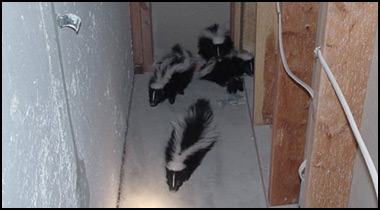Seattle Skunk Removal Resources
Skunk Rehabber - A Wildlife Pro: (206) 799-6403
Free King County Animal Services: 206-296-7387
Humane Wildlife Trappers of Seattle: 206-829-4744
If you need skunk control in Seattle, you have a few options. First, you can attempt to solve the skunk problem yourself by reading our do-it-yourself guide. If you need outside help, you can also call King County Animal Services to see if they have any free resources or help for you - however, they primarily deal with dog and cat concerns. You can also call a local Seattle wildlife rehabber, as they are typically a great resource for advice that is in the best welfare of the animal. If as a last resort you must hire a professional company, we recommend Humane Wildlife Trappers of Seattle at 206-829-4744. To learn more about them or check their skunk removal prices, visit seattlepestanimal.com.

Seattle Skunk Trapping and Removal

Preventative Repairs & Exclusion

Seattle Skunk Removal From Structures
In many cases, preventative measures can solve your Seattle skunk problem - keep garbage secured, pet food indoors, and most of all when it comes to skunks, secure the perimeter of your shed, porch, deck, or house with a barrier - lattice or steel mesh is good, and it keeps Washington skunks from going under the structure. If trapping and removal of the skunk is the only option you have, please do so with the help of a local agency or professional company who knows how to do it humanely and legally. Browse the resources of this site for more educational information.
Frequently Asked Questions:
Prevention: How to Keep Skunks Away
What to do with a skunk after I catch it?
Is it legal for me to trap a skunk?
How to remove skunk odor
Is a skunk active during the daytime rabid?
What does skunk feces look like?
Seattle Skunk Control Information: Do skunks hibernate in the winter?
The term Hibernation refers to a state of inactivity accompanied by metabolic depression in warm blooded animals. Hibernation also refers to a season when warm or cold- blooded creatures experience lowered body temperature, slowed breathing and heart rate, as well as a low metabolic rate. Often we, as humans, think that all wild animals hibernate when the weather becomes cold. This is not always the case. Take the skunk for example. The cold weather will certainly slow the skunk down, but in the winter and early spring skunks may be seen out of their dens at almost any time of day. They are especially active before and after a long period of snow cover or low temperatures as they are foraging for food to sustain them. Skunks do not hibernate in the winter; but they do sleep more.
For skunk and all wildlife removal in Seattle WA, visit www.seattepestanimal.com website to learn more
They are able to survive these extended periods of sleep to by binging on food before the weather turns bad. This overeating allows the skunk to lay on layers of fat that will insulate its body and "feed" the skunk while it sleeps. When the weather begins to change the skunk begins to look for a suitable den. It may dig its own under your porch or shed. It might choose a hollow log. Most likely it will look for one abandoned by another creature like a fox or wood chuck.
Once the colder temperatures begin to set in, the skunk will start preparations on its new home. Then it will block off the entrance to the burrow with dried leaves and grasses to keep cold air out. Often the striped skunk will find a companion to burrow with. This will supply extra warmth for both partners. This process is called social thermoregulation. It is where two or more creatures use each other in an attempt to stay warm. An interesting fact is that Male skunks will often den communally in the winter months, but will not tolerant each other any other seasons.
Remember, for free services you can try (206) 799-6403 or 206-296-7387, but if you need to pay for professional help, check the prices at the seattlepestanimal.com website. Or follow our do-it-yourself guide!

